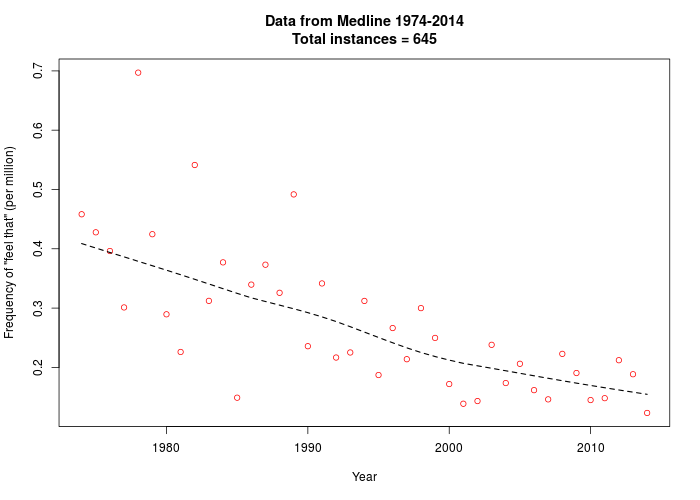"Feel that" has been disappearing
« previous post | next post »
The recent flurry of posts on feel as a propositional attitude verb has, I now feel, buried the lede. Kids today may have started using "feel like S" with increasingly frequency in recent years. But their elders have apparently been abandoning "feel that S" ever since the middle of the 20th century.
The first clue was from MEDLINE:
The same trend is visible in Google ngram counts, though the overall rate is much higher:

The same pattern is visible in data from COHA, though again the rates are somewhat higher:

And U.S. Supreme Court Oral arguments 1955-2103 show the same pattern as well, though the base rates are higher still:
So today's youth are just filling the rational-feelings vacuum created by preceding generations.
The rest of the Rational Feelings series:
"Feelings, beliefs, and thoughts", 5/1/2016
"Etymological metaphors and meanings", 5/2/2016
"Feeling in the Supreme Court", 5/3/2016


J. W. Brewer said,
May 3, 2016 @ 10:47 am
A somewhat different usage of "feel like" is old enough to be the subject of prescriptivist deprecation (as a vulgar-yet-nigh-universal Americanism "not justified by the usage of the best writers of English" way back in the 1880's (in a piece by W.W. Story, apparently originally appearing in Blackwood's Magazine but reprinted in various other periodicals known to the google books corpus). The usage complained of was e.g. "I don't feel like VERBing OBJECT," or a question of the form "Don't you feel like beefsteak" in the sense "wouldn't you like to eat some steak" rather than "don't you subjectively feel as if you yourself might be a steak."
J. W. Brewer said,
May 3, 2016 @ 10:51 am
Should have checked before posting prior comment, but I'm assuming the peeving W.W. Story was this dude: https://en.wikipedia.org/wiki/William_Wetmore_Story. The Harvard curriculum of the 1830's apparently failed to provide him with a good grounding in the descriptivist approach to linguistics.
Lazar said,
May 3, 2016 @ 10:53 am
@J. W. Brewer: Immortalized in the slogan, "Sometimes you feel like a nut. Sometimes you don't."
Roscoe said,
May 3, 2016 @ 11:02 am
@Lazar: See also "I feel like chicken tonight!"
Jordan Waxman said,
May 3, 2016 @ 11:27 am
I feel like the other missing piece of the puzzle here is the aversion of older generations to the use of the word "like", so that to them whatever sins "feel that S" carried, "feel like S" is even worse.
Guy said,
May 3, 2016 @ 12:57 pm
I feel it's difficult to conclude too much from this without controlling for reductions in optional uses of "that" somehow.
[(myl) See e.g. this plot from one of the earlier posts:
Or consider this one.]
Ralph J Hickok said,
May 3, 2016 @ 1:12 pm
"Feel like S" becomes "feel like shit" in my dirty mind, and that's an entirely different sort of construction.
Mark F. said,
May 3, 2016 @ 1:14 pm
I see from the data that "I feel like" really is increasing, so I can understand how a professor (who, year over year, talks with lots of people in a fixed age range) would notice the change and attach meaning to it. But to me the whole discussion sounds bizarre, as if I were told people should quit saying "It seems to me that" so much.
un malpaso said,
May 3, 2016 @ 3:07 pm
I feel you.
Mr Punch said,
May 3, 2016 @ 6:01 pm
In college I was assigned a book by William Wetmore Story (about art, not grammar).
Joseph C. Fineman said,
May 3, 2016 @ 8:30 pm
When I was little (southern California, 1940s), my parents had immigrant friends, and according to my mother the idioms that they found most hilarious were "I feel like a cocktail" & "My feet are killing me".
Rod Johnson said,
May 3, 2016 @ 10:39 pm
In isolation, this suggests the possibility that like is becoming a complementizer. I can't think of many other verbs that take like S as a complement, except for the case of seem, which isn't an exact parallel.
a, I feel like/that you're not listening.
b. It feels like/*that you're not listening.
c. *I seem that/like you're not listening.
d. It seems like/that you're not listening
So there seem to be two distinct frames for feel like, one with an empty subject and an S complement (b), one with a "full" subject (a). The empty subject one pretty clearly doesn't ascribe any emotion to the subject. It can even undergo some kind of subject raising:
e. You feel like you're not listening.
where the person doing the "feeling" is the speaker, not the subject.
Whatever this pattern is, it doesn't seem to have spread to other verbs, does it?
Ran Ari-Gur said,
May 3, 2016 @ 11:05 pm
@Rod Johnson: One of Dr. Liberman's recent posts on the subject included a link to Marisa Brook's 2014 paper "Comparative Complementizers in Canadian English: Insights from Early Fiction", which may interest you. (The paper itself is about how like came to dominate the alternatives, especially as if and as though, in Canadian English; but its abstract and background give a good bit of information about prior work on its syntactic properties.) Aside from feel and seem, it also lists appear, look, and sound.
(Though I find "to appear like" to be rather awkward, personally; I think there's a register mismatch.)
[(myl) From Harriet Beacher Stowe, Dred, A Tale of the Great Dismal Swamp (1856):
Sometimes, when I 'm studding upon dese yer tings, I says to myself, 'pears like de trees in de wood, dey loves each oder.
]
Rod Johnson said,
May 4, 2016 @ 8:40 am
Thanks, interesting.